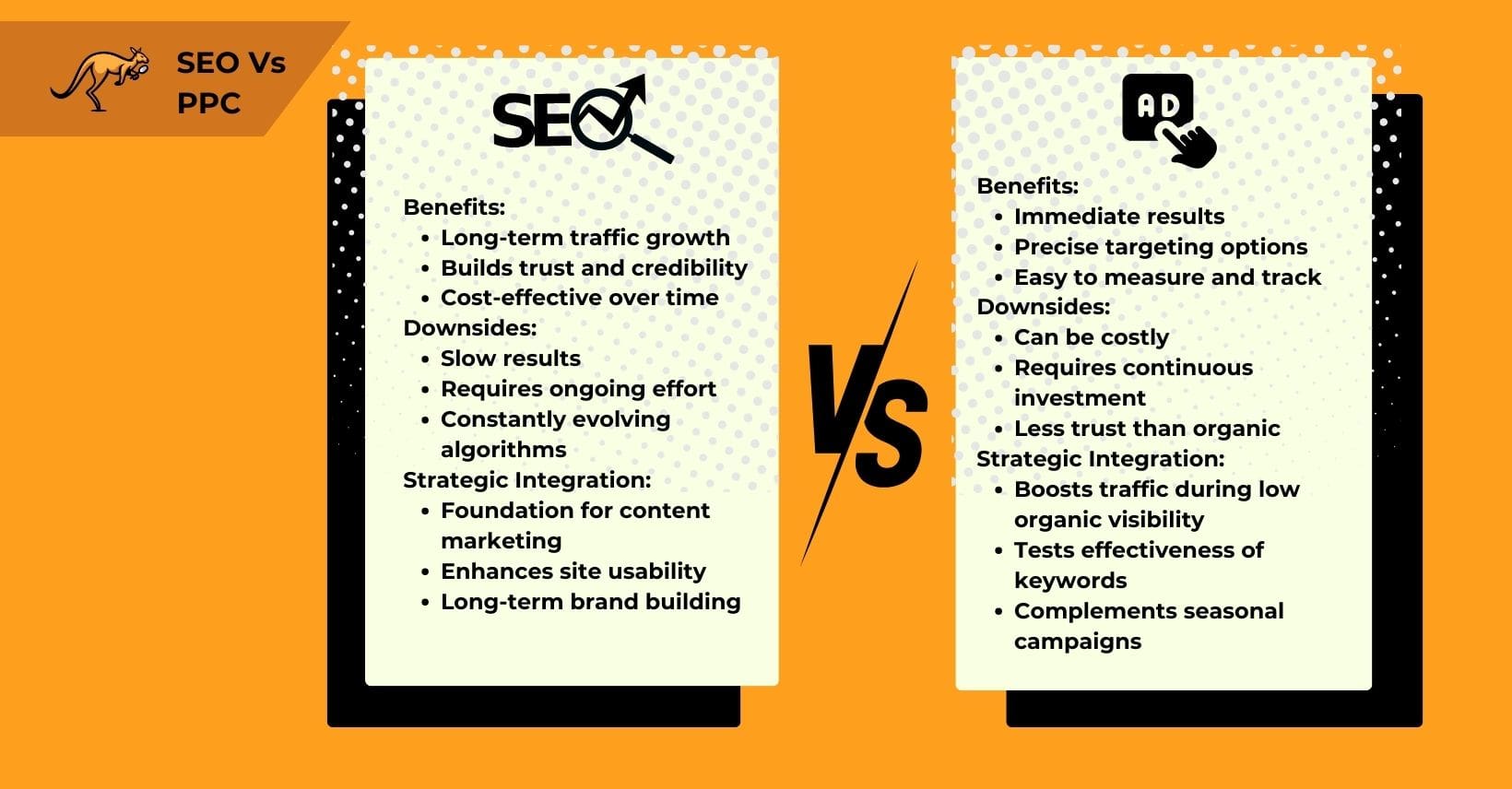Keywords are fundamental to SEO, and effective marketing hinges on thorough keyword research. This process involves identifying and selecting the most advantageous keywords to guide your SEO strategies.
While pinpointing the right keywords is a important step, it has challenges. Sorting through potential keywords to find those that best align with your business goals requires careful consideration and strategy.
Fortunately, trained with the appropriate knowledge and tools, navigating keyword research becomes more manageable.
Understanding this process and learning to sidestep common pitfalls paves the way for mastering the basics of keyword research.
The Basics of Keyword Research
For those new to SEO, keyword research might seem unnecessary—why not just use terms that naturally come up in your content? Yet, this overlooks the nuanced role keywords play in search engine optimization, where they serve as more than mere references to content themes.
Their strategic selection and integration into content greatly influence a site’s search engine visibility, diverging from simpler SEO features.
This critical distinction underlines the need to delve deeper into what keyword research entails, setting the stage for a comprehensive exploration of its definition and significance.
What is Keyword Research?

In simple terms, keyword research is the process of looking at the keywords your audience uses in their search queries, mainly to find new and data-driven keyword ideas.
This gives you keyword ideas based on what your target audience is actively searching for.
Why is Keyword Research Important?
Keyword research is crucial in SEO because it identifies phrases your target audience frequently searches for.
By optimizing your site to rank for these keywords, you enhance your visibility in search engine results, directly increasing site traffic and brand awareness.
They are targeting the right keywords positions your website to intercept potential customers during their search activities, which drives organic traffic.
This strategic placement boosts visibility and prompts us to explore the characteristics that define a good keyword, ensuring that the terms you target maximize engagement and conversion potential.
What Makes a Good Keyword?

In keyword research, you are not just looking for any old keywords. You are looking for keywords that your site can actually rank for.
This all depends on three factors:
- The relevance of the keyword to your site’s industry, content, products, and purpose
- The amount of power that the keyword carries
- How many users are searching for that keyword
Of course, we can’t just leave this off here. Below is a breakdown of what these factors – relevance, authority, and volume – actually mean.
Relevance
Choosing relevant keywords is important. The more relevant a keyword is to the exact things you are using that keyword for, the better it will perform.
Search engines take relevant keywords into account when ranking, and your content will only rank if it is relevant to what the user is searching for.
Platforms like Google want every result to be useful to the person who finds it, so irrelevant keywords are basically worthless.
The more relevant the content is, the better.
No matter how many keywords you stuff into an article, it will not rank as high if the user is searching for something that is relevant but not quite in the same niche – for example, a car dealership will not necessarily rank high for searches about car customization.
Authority
Authority is a way to refer to the weight that search engines place behind keyword sources.
In this case, this applies to your site – the authority of keywords you choose depends on the site they are being used on, whether that is in a link building context or just in an article header.
Being an authoritative source means offering users quality content of value, and this is a big part of ranking for certain keywords.
The better a site is at offering value to its users, the higher it will rank on search engines.
This also covers your site’s overall quality.
A site that is considered a spam source or that does not offer any real value to users will have lower authority, meaning that you are going to rank lower overall compared to sites of a higher authority (although this does not mean you can’t still overtake them in other ways).
Search Volume
Search volume is, essentially, the number of times a keyword is searched in a given period. In a perfect world, you would only ever target high-volume keywords.
This is because those keywords are the most popular and, thus, the most valuable.
It is not quite that simple, though. Keywords with a higher volume are naturally more competitive, and the more popular a keyword is, the harder it can be to rank for.
On top of this, the more targeted and detailed keyword is, the less users will search for it.
This means that you should balance out keywords based on their search volume.
Targeting low-volume keywords may not lead to a lot of traffic, but it might draw in a niche audience that you have an easier time turning into proper customers.
Ranking Difficulty
Keyword difficulty quantifies the challenge of achieving high search rankings for particular terms, guiding you in selecting keywords worth your investment. This metric, influenced by competitor activity and potential returns, helps strategize which keywords to target for optimal outcomes.
Understanding this, identifying the right keywords becomes pivotal, transitioning seamlessly into exploring effective strategies for discovering those keywords most aligned with your SEO goals.
How Do You Find Keywords?

Keywords as a concept are quite straightforward, but finding them is not easy.
As the name suggests, keyword research is all regarding research first and foremost.
This means that you do not just want to choose a random selection of keywords, even if they are relevant to your site, because there is no guarantee that they will give you any useful benefits.
In general, you need four things to research keywords effectively:
- An understanding of your audience and their search intent
- A marketing and SEO plan that can direct your keyword research decisions
- An overall marketing and content strategy that you will use the keywords for
- At least one reliable keyword research tool to simplify the process
However, whether you have these or not, keyword research requires some foreknowledge and planning to do correctly. Here are some general techniques that can help with the keyword research process.
Use Seed Keywords
Seed keyword research is an incredibly powerful way to kickstart your keyword research process.
The general idea is to have a list of obvious starting keywords, such as different types of coffee for a coffee business or different car models for a car dealership.
While these might not be worth targeting on their own, they provide a solid foundation to help you seek out related keywords.
This can give you the initial push to target your keyword tools in the right places.
They can also serve as a measuring stick for judging things like search volumes and ranking difficulty, letting you compare your potential new keyword ideas with the initial keyword ideas that you had right off the bat.
Remember, seed keywords are not necessarily worth chasing since they will often be simple and have a high keyword difficulty score.
They are more useful as a basic keyword list that helps direct you to relevant keyword ideas and other target keywords within the same niche.
See What Competitors Rank For
Another way to generate keyword ideas is to look at the keywords that your competitors are ranking for.
This is an effective way to see what their audiences are looking for and, therefore, what kinds of topics you should be writing regarding as well.
The closer your competitors and their products/services are to your own business, the more valuable this process is.
For example, if your competitors are targeting the same market, then you will have similar customer bases.
This allows you to find keywords that already have a proven track record, as well as providing a starting point for your own research.
You can do this technique quite easily by simply running one of many free keyword research tools over your competitor’s website.
Of course, if your competitors are targeting a different market altogether, then you need to adjust your strategy to compensate.
These keywords can still be useful, but you will have to pay attention to the different ways your audience uses these terms – if they even use them at all.
This is a very effective way to get new keyword ideas that you would have otherwise missed, and you can repeat the process on as many competitors as you want.
However, the larger scale you go, the sooner you may need to upgrade from free keyword research tools to paid ones.
Use Your Keyword Research Tools
While it might sound obvious, it is easy to get side-tracked with niche uses of keyword research tools when the tools themselves are still incredibly powerful.
If you are using a keyword research tool correctly, you can basically get infinite free keyword ideas.
All keyword research tools work in the same basic way: they gather a massive collection of keyword ideas based on the words or phrases you use and present a filtered list of results that you can choose from.
This is the best way to use your seed keywords – put them in the keyword tool of choice and see what relevant keyword ideas the tool pulls up.
These results are not guaranteed to be useful, though. This means that it is important to filter them out through things like monthly search volume limits or by simply ignoring anything that is too close to your seed keyword.
Of course, not all keyword research tools are created equal. Some have more advanced functions that others lack or simply are not built in the same way.
It is up to you to find a tool that suits your needs.
Every keyword research tool works in a slightly different way, so you should make sure you understand how your exact tool works (either through using tutorials or learning first-hand) if you are brand new to keyword research.
Use Your Business Niche
Understanding your business goals and the products you offer is important as it guides the selection of effective keywords for your SEO strategy.
By putting yourself in your customer’s shoes, you can identify precise, low-volume search queries that are highly relevant to your offerings, such as “how long does a (generator model) last?” or “(generator model) fuel capacity.”
While niche and less competitive, these targeted questions have a higher potential for conversion.
Focusing on such detailed keywords allows for precision in your SEO efforts, leading seamlessly into the essential next step: learning how to measure the effectiveness of these keywords to optimize your strategy further.
How to Measure Keywords
Keyword research is very data-driven, and all keyword research tools are built around dumping this data out in an organized list.
However, picking through the keyword ideas means understanding what this data means.
Even if you can guess at some of it by context, it is important to know how the various measurements impact the various keywords that you are being given.
Keyword Search Volume
As mentioned before, search volume measures how often a exact keyword is searched for in a given month.
The higher the number, the more people are searching for that keyword, and therefore, the better the keyword is likely to perform.
However, this also tends to mean more competition, which can increase keyword difficulty and lower the chance that your content will rank highly.
You can use search volume as a rough indicator of the value of a given keyword when taken out of any context of relevance.
The higher the search volume, the more users are looking for it, which naturally makes it a stronger choice.
Of course, in reality, this is also influenced by things like authority and relevance.
A high search volume is not necessarily good if your page has a low level of authority or if your keyword is something that does not really relate to the site or page that you are using it for.
There are four major factors to know when looking at search volume:
- Search volume reports the searches, not the individual users. This means that one user searching for a keyword 200 times in a year would be counted as 200 searches for that keyword
- Search volume is country-exact. This means that the search volume for a given keyword in the UK might be very different from the search volume for that same keyword in the US
- Search volume is an annual average and is based on a yearly total, meaning that a keyword that got 90% of its searches in a single month will still be reported as whatever the average (i.e. the total divided by 12) would be
- Search volume does not tell you how many visits you would get if you targeted that keyword and only shows the actual search volume for the term. This means that the number is an estimate and will not give you an exact count of users who clicked through
Many keyword research tool options will have options for filtering by search volume, letting you exclude either high or low search volumes depending on your needs.
Keyword Difficulty
Again, as mentioned above, keyword difficulty is regarding how hard it would be to rank for a given keyword.
Not every keyword research tool presents a keyword difficulty score, but there are keyword difficulty checker tools that can fill in that gap.
While it is not a very exact measurement, keyword difficulty is important for understanding which keywords will be easier to rank for and which will be harder.
This is especially true if you are trying to rank for more popular keywords, which are going to be harder to rank for due to the sheer amount of competition.
Having this estimate can also be useful for seeing the potential chances of actually succeeding with a given keyword, especially for people who are starting out.
Keyword CPC
CPC stands for “cost per click” and is a standard metric used to show the monetary value that advertisers would be willing to pay for an ad on that keyword.
While this is not that useful for SEO, it matters a lot for paid marketing.
Being able to see a CPC estimate allows you to see how expensive it would be to advertise on a given keyword.
If you are looking for keywords that might work for AdWords or similar platforms, then you will want to keep an eye on this.
In general, higher CPC means that you would need to spend more for any reasonable level of success. Beyond that, CPC is very volatile since it is based entirely on what advertisers are paying right now.
This means that you need to watch this closely and keep an eye on what the CPC estimates are saying since a spike in CPC could mean that a keyword is suddenly outside of your comfortable price range and effectively exclusive to companies that can afford to match the competition.
Traffic Potential
Traffic potential is not as simple as it sounds. While keyword research tools might say that two keywords are almost identical, their traffic potential usually is not.
This is because of two factors: the context of the keyword and the sites that are actually targeting them.
Both of these can dramatically alter how much traffic a keyword gets on average or how many of its average monthly search volume users will actually click on it.
Web pages do not rank purely for one keyword, and the surrounding context also really matters.
The exact phrasing of the search query, the content on the page itself, and the header of the page that users find all influence the total traffic potential that you are getting.
This can be judged by using keyword research tools to look for the top-ranking pages for a keyword and then breaking down how much search traffic they get for each variant of your chosen keyword.
This is a bit of a manual process, but it can be worth doing since it can give you a solid estimate of which keywords are actually likely to deliver traffic rather than simply placing your site in search results.
Other Measurements
Navigating the depth of data within keyword research tools is essential for effective SEO. These tools present various insights, from trends to low-competition and long-tail keywords, each to enhance your keyword strategy.
Taking the time to fully grasp your chosen tool’s nuances unlocks its full potential and equips you with the knowledge to conduct keyword research with precision.
This foundational understanding is the first step into mastering the art of keyword research, guiding us seamlessly into exploring the methodologies for conducting keyword research correctly.
How to Do Keyword Research Correctly
Keyword research can be an arduous task, especially if you have never done it before. But even if you have, it can be easy to learn bad habits that will end up slowing down your workflow.
Fortunately, keyword research can be learned through practice.
Below with the right techniques and tools, you can learn how to do keyword research correctly, and you can save yourself time and headaches while you do so.
Choose a Good Keyword Research Tool
Your keyword research tools are the foundation of everything you do in a keyword research context, whether you are using Google Keyword Planner or a completely independent option.
If you are new to keyword research, then the first thing you need is a free keyword research tool, preferably with a wide array of features.
This gives you a solid starting point for your research, allowing you to start looking for keywords and their related information without eating into your budget.
Tools like Google Keyword Planner become useful even if you upgrade from free keyword research tools to paid ones, so do not hesitate to use a mixture of paid and free keyword research options.
The important thing is that you choose keyword tools that get the job done.
Personal preference matters here since the best tools are the ones that are fitted to your needs and are the easiest for you to work with.
Choose Other Useful Tools
While Google Keyword Planner is an obvious keyword research tool, something like Google Search Console is not. However, this does not make tools like Google Search Console obsolete in keyword research.
The right tools can help with SEO, keyword research, and marketing in other ways, from indirectly analyzing keywords to gathering data on your target audience through Google ad campaigns and other data sources.
Some of these include tools for analyzing backlinks and competitor analysis and a whole host of other tools that can help you gain a wider understanding of the landscape that your website is trying to carve out a niche within.
Not only does this help with keyword suggestions, but it might also inform your marketing and content strategy going forward.
Keyword research is influenced by more than just keyword data, and you need to understand your keyword list in the context of your wider marketing success (or failure).
Identify Your Niches and Core Topics
Before you can do keyword research, you need to identify your core topics and the exact niches that are most relevant to your site.
This is something that you will be building up as you go, especially if the site belongs to a brand-new business that just opened, but a little preparation will make the entire process easier.
You might have a rough idea of your niche or your overall subject matter, but having a clearer, more focused version can give you a starting point to use as a foundation for the rest of your SEO.
You do not need to know all the keywords that spin-off from your seed keywords or have an instant recall of relevant Google trends.
However, you do want to know at least a little about your identity and audience so that you can find keyword ideas that make sense.
Identify Parent Topics
Parent topics are any particular keyword that can spin off into many other variations. These go hand-in-hand with your site’s overall niches since they are often core-related keywords that form the general foundations of your keyword research.
For example, a car dealership might have “cars” as a main seed keyword. This could be broken off into a huge alternate keyword list, but these will all be subtopics of the main topic of “cars.”
You can find this by searching on Google or other search engines. If you type in “cars” and “buying cars,” many of the results will be the same, so “buying cars” is a subtopic.
However, “offroad cars” brings up an entirely new set of results, so the keyword “offroad cars” is its own target keyword.
This becomes important to know as you gather more keywords since you can use this to avoid overlap by targeting parent topics rather than creating three dozen pages for each variation (unless that was your plan from the start).
Use Long-Tail Keywords
Long-tail keywords are any keyword made up of more than three core words and are often used to narrow down that keyword to a more exact niche.
For example, “sports shoes” is a short-tail keyword, but “sports shoes for playing football in winter” is a long-tail keyword.
This is important because long-tail keywords are more precise while also receiving less direct search volume overall.
Targeting long-tail keywords can be useful for capturing special searches or users who are in the market for a precise kind of product that you sell.
If you are selling some blue winter shorts shoes, then using the term “blue winter sports shoes” can capture anybody making that exact search.
Understand Search Intent
Your audience makes every search with a search intent behind it – meaning their goal for that exact search.
This might be to make a purchase, sign up to a site, or find a service provider. Whatever it is, understanding the intention of your audience’s search will give you an idea of how to present your content.
Search intent can vary a lot based on the exact audience, the keyword that is being used, or the industry that you are working within.
Knowing the search intent of your audience lets you target exact keywords related to their goals, helping you customize each page or piece of content to suit the exactsearch intent that brought them there.
For example, if your audience is usually searching for guides on how to use a product or tool, then creating how-to guides with those relevant keyword suggestions can make a huge difference to your incoming traffic.
This ranks you for terms that they are using in their search results, meaning that you are more likely to appear in those kinds of search results in the future.
Search intent keyword data effectively gives you access to more keyword ideas based on why your audience is searching, letting you build up a selection of keywords based on their goals and intentions.
Always Use The Best Keyword Research Tool For Each Task
Utilizing various keyword research tools is essential, but selecting the optimal tool for each distinct task is key.
For instance, while Google Keyword Planner excels in broad keyword research, Google Analytics provides direct insights into search data. Other tools like Keyword Explorer offer search volume metrics but need more data integration with Google Ads.
Remember, no single tool covers all aspects of keyword analysis and should be used with tools for marketing and search engine optimization. This approach ensures a comprehensive strategy, integrating the strengths of each tool to enhance your overall SEO effectiveness.
This synergy among different tools is important as we discuss using all these keyword research elements in the next section.
Using All Of These Keyword Research Elements Together
If you have read through this entire article, it might be overwhelming to see so many details at once.
However, from analyzing keywords and breaking down Google trends to writing blog post content, keyword research is basically a melting pot of skills and opportunities.
There is no keyword magic tool that can just solve the problem for you, and even the most expensive paid keyword research software can only do so much. You need to combine all of these skills together to succeed.
Top-ranking pages do not get there because of one free tool making the difference or because of a single blog post, but thanks to these countless different techniques and factors below that make a difference.
Always Target The Right Keywords (In The Right Way)
While there is not a keyword magic tool that can point you to the best target keyword for each situation, a good range of marking, analytics, and SEO tools can make it easy to pick out the right keywords for your needs.
Whether you are judging this based on data like monthly search volume or just looking for the most relevant search results you can find, having access to even decent tools essentially gives you a free keyword generator that you can use any time you like.
Of course, this is only half the battle. If you have found the perfect keyword, then you still need to figure out how to use it effectively.
The key to a good keyword is knowing the best way to use it and then creating the perfect opportunity to take advantage of it.
This can mean anything from creating blog posts to running specially-prepared ads or simply creating the best content and structure possible to suit the keyword and your audience.
If you listen to the data that your SEO tools are giving you, it becomes a lot easier to guarantee that you will make the right choices with your keywords.
Use Keyword Planner and Other Tools Regularly
If you have access to effective SEO and marketing tools, there is no reason not to keep using them regularly.
This can keep you up to date on any new data and can let you adjust your keyword focus based on what works for you.
This means that if your keyword focus suddenly drops off, you can figure out why or even if the latest Google algorithm updates are affecting your rankings.
Not only that but using some of the best keyword research tools on a regular basis makes it much easier to catch new keyword opportunities before a competitor can snap them up.
Keep Learning, Keep Testing
Even the best keyword research tools will eventually fail, and the world of search engine optimization and marketing is always changing.
This is because Google likes to update its algorithms, and new competitors appear every day.
You will have to keep learning and testing things if you want to stay competitive, and that includes the keywords that you thought you could rely on.
Make sure that you are always looking for new opportunities and ways to improve your marketing, even if you are already in a comfortable spot and do not have much active competition.
Remember that tools like Google Analytics are a good place to turn for information that keyword-specific tools can’t give you, which might help if you are trying to adapt to sudden changes.
Final Analysis: Key Takeaways from Comprehensive Keyword Research
Keyword research can be an incredible asset, especially when done with a complete understanding of what you are looking for.
It can give you a deeper understanding of your target audience, help you rank for more competitive terms, and can even be the difference between making a sale and failing altogether.
Unfortunately, there is a lot of bad information regarding keyword research online.
You can waste a lot of time following bad advice and chasing the wrong keywords, which will not only slow down your efforts but also leave you without the results you want.
While this guide broke down a lot of details regarding keyword research as a whole, this is still only scratching the surface of how detailed everything can get.
Unfortunately, for most businesses, a lot of keyword research can’t be taught. You need to go out there and look at your own business niche, audience, products, and services – and learn to think like your audience.
This will require some experimentation and trial and error, but it is the only way to actually get better at the fundamentals of keyword research.



